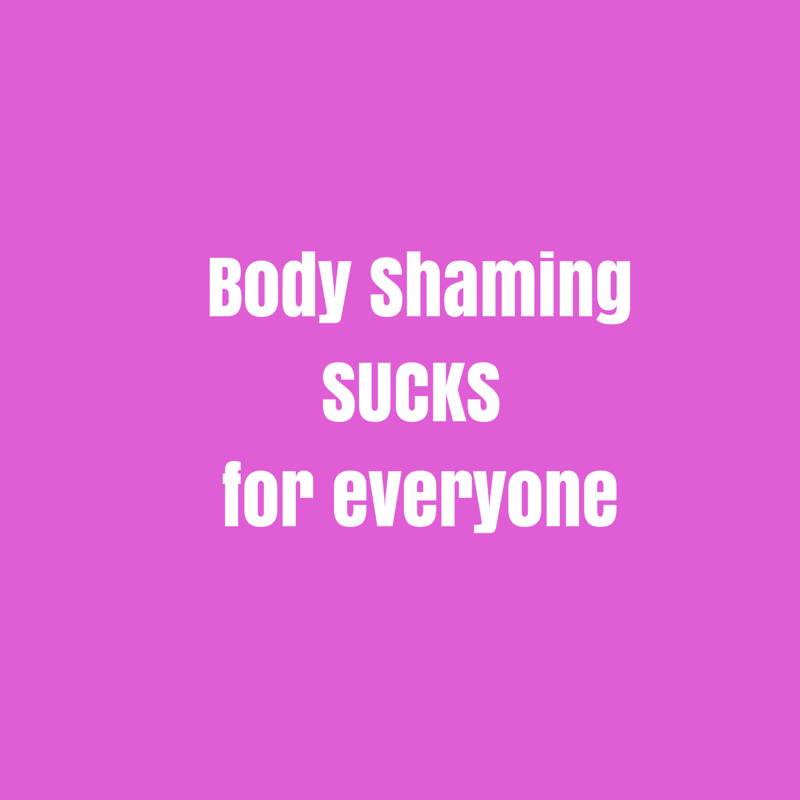I have started and stopped writing this blog about body shaming many times. It is very hard to write about a controversial issue, especially for a people pleaser like me. I am going to take a hard edge on something that I think is destroying us—each and every one of us.
Shaming is destroying us.
Fat shaming, fit shaming, publicly shaming, privately shaming, internet shaming, blog shaming, bikini shaming, curve shaming, muscle shaming, blond/brunette/ginger shaming, skin shaming, so much shaming I can’t even list anymore because it is making me sick. I guarantee you have been shamed at least once about your looks/body or clothing/style choices.
It has happened to all of us, no matter what.
It’s also very common to let this happen to us. We do it to ourselves, or we listen and believe what others say about us. As humans, we are sensitive beings who all long to be a part of something (fit in), to be loved, and to be happy; yet we destroy ourselves and others by criticizing, judging, and shaming bodies.
Shaming is always painful.
I don’t often share this story because it reminds me of a time in my life when I was sick, miserable, and weak. In college, I was aspiring to be an actress. I had imagined my life as a starving artist in a big city, “living the dream.” One of my acting coaches once told me that I would never be leading lady material because I was the wrong shape. This particular coach recommended that I lose 10-20 pounds to fit the roles that I was looking for, or to settle for the “quirky best friend/sidekick.”
Looking back at this, it sounds like terrible advice. I scoff at it now and try to imagine a witty comeback I could have used. Instead, I believed it. I let those destructive words become my truth. This advice led me to even more destructive behavior, diets, and self-esteem issues. This was NOT my first time being body shamed, but it is one that I can still clearly remember. It’s a painful memory, not because the words were hurtful (even though they were), but because I believed them.
Our stories all have a common theme.
Your story might be a bit different, but we all share the shame, embarrassment, and even destructive behavior. You might not be hearing this from a teacher or mentor, but we are all hearing the same message. It may be in passing at a beach or in the gym. You may hear this while trying on new clothes at a department store. Your story may stem from emotionally abusive relationships or family members. This message appears in magazines, television, social media… everywhere! Instead of having a witty comeback, and letting those remarks and “ideal” images roll off our back, we are manipulated into believing them.
Then we team up and shame others.
This is another part of the shaming culture that absolutely tears me apart. Once we are shamed, we often share our stories because we are hurt and angry. Instead of friends and family being empathetic and supportive to help you heal, many times we team up. These teams offer support, which is fantastic, until it turns around again. These teams end up shaming the opposite of why they were shamed. (Does that make any sense?)
In my experience there is no middle ground. You were shamed for being curvy, you team up with other curvy girls and claim that “real men love curves.” You were shamed for being too muscular, you team up with others and remark “your workout is my warm up.”
This has to STOP!
This kind of shaming is separating humans into categories. Well, guess what? There is no black and white here, it is all gray area. If you think it is as easy as being skinny, fat, strong, or weak you are extremely mistaken. I know women who can throw massive amounts of weight over their head but are called pigs at the beach. I know very muscular women who don’t feel comfortable in their bodies due to others comments. It is all gray area. If I know one thing, it is that you do not know anyone’s story by looking at their body.
For our health.
Does anyone else notice something missing from these conversations? Health. We are so focused on the outside image that we strive for a dress size or a number on the scale, even if we feel awful and sick most of the time. The “ideal” image is always the topic, not sustainable health. Now, I am not saying that it would be better if we were shaming people based on their health. I don’t believe that shaming in any way can produce results that are positive. It isn’t until we embrace ourselves and our health that we can create a life and a body that we love.
A very serious side note: Something we fail to mention is mental health when it comes to this kind of shaming. The stress, depression, and eating disorders that can develop from the culture of shaming can actually kill. Not fitting in, or feeling inferior and unhappy in one’s body has caused people to become unhealthy, sick, and has even cost them their lives. If this is an issue in your life or someone you know, please seek medical attention and support.
Take steps toward change.
Where do we go from here? What can we do to really make a change? Will my body positive posts even make a difference?
First, we have to start within (as cheesy as it sounds). You cannot control what happens on social media, you cannot control what is printed in magazines, but you can control how you process that information. You can control what you contribute to the conversation.
Gandhi said it best: “Be the change you want to see in the world.” Start with you.
Baby steps to start:
- Limit Exposure to the body shaming culture – Unlike the pages that constantly post the information that makes you cringe. “Hide” posts that shame other people, and unfriend (online and maybe even in person) the people who continue to make you or others feel bad about their bodies. Unsubscribe to the magazines that use articles or ads that make you feel bad about your body or yourself.
- Analyze everything – When you do come across a post, story, or article that makes you feel shame or shames a certain group of people based on their body, analyze it. Ask yourself, what is the point of this article? Does it service or help anyone? Why does it make me feel bad? Am I letting this opinion in the media (or from a friend) affect my own opinion of myself? If you come across a body positive group, friend, or post, analyze it! What is their story? Can I relate? What steps have they taken to become more confident, and comfortable in their skin? Can I take this person out to coffee or subscribe to this group and surround myself with this positivity?
- Notice everything within – Listen to the conversations you have with yourself. Notice what you see, think, and feel when you look in the mirror. You can’t change it if you don’t open your eyes and ears to notice what is going on. Are you holding on to negative messages that you received from an outside source? Does your self-shame stem from comparing yourself to others or an impossible standard?
Shaming won’t stop overnight.
Taking these baby steps will help you realize how much you are actually exposed to the body shaming culture. At first it may be hurtful to keep your eyes open and let yourself analyze and notice what is going on within these articles and within yourself. I promise it is all part of the journey. We have to admit our story in order to be able to change it.
What is your story? What is the story you are telling yourself? Are you ready for a better story?


What a powerful and great article! This a great reminder to love yourself no matter curvy, skinny, muscular, etc! I can sure relate!